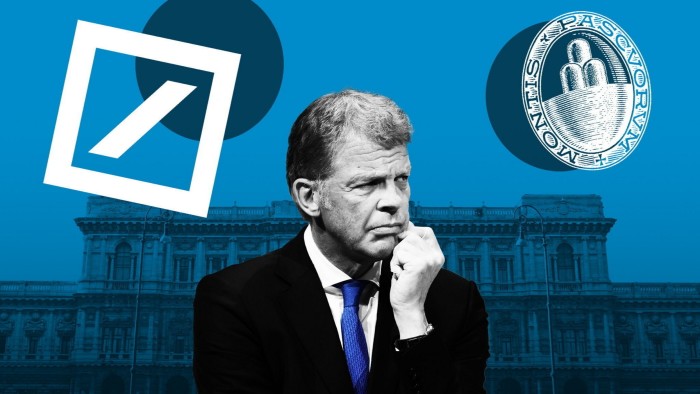Deutsche Bank chief executive Christian Sewing has become embroiled in a €152mn lawsuit that alleges he was involved in a decade-old cover-up of financial crisis-era transactions.
A new civil case in Germany brought against Deutsche by Dario Schiraldi, a former senior banker, claims that Sewing presided over a flawed internal audit which formed an important part of the evidence used to convict Schiraldi in Italy in 2019.
Schiraldi’s conviction was overturned in 2022 and he is seeking damages for alleged harm to his career caused by the criminal proceedings and outcome. Five other Deutsche bankers convicted and then acquitted in Italy are weighing separate lawsuits in London, according to people familiar with the matter. Deutsche is in settlement talks with at least one of them.
Although Sewing is not a party to the litigation, the allegations threaten to embarrass the chief executive of Germany’s largest listed lender, who has been seeking to clean up the reputation of the scandal-prone bank.

While the Italian court proceedings concluded in 2023, when the country’s supreme court upheld a decision to quash the bankers’ convictions, the importance of the internal audit to the original case — and Sewing’s personal involvement — has only recently come to light with Schiraldi’s civil case.
Deutsche said that Schiraldi’s lawsuit “includes misleading and false allegations around the audit which are manifestly an attempt to generate publicity by seeking to damage the good reputation of executives. We are confident that the court will dismiss the claim,” it said.
Schiraldi declined to comment. The allegations about Sewing were first reported by Der Spiegel.
Documents seen by the Financial Times show that Sewing, as head of the internal audit department, was asked in 2013 to investigate the reasons for the accounting of transactions with troubled Italian lender Monte dei Paschi di Siena dating back to 2008.
The German bank had changed the accounting treatment and restated its results.
Deutsche said that it had been forced to change the treatment of the deals after learning how the bonds underlying the MPS transactions were sourced. People involved at the time maintain that the source of the bonds was widely known and that the bank needed to justify its change, which helped secure more favourable capital treatment.
The audit pinned the blame on a handful of individual bankers. While it did not find criminal wrongdoing by the bankers, Deutsche said “it identified material failings in the way the transactions were handled by the deal team and other functions”, including “not disclosing sufficient information for the transaction to be properly reviewed before it was executed.”

While it may not have been the original intention to implicate the six employees, said one person close to them, that was the result. The audit helped establish and confirm the idea that the sourcing of the bonds was discovered late, the person added.
Sewing’s audit, and a summary of it provided to the Italian central bank in 2014, “unquestionably influenced” Italian prosecutors, according to the Milan Court of Appeal. Schiraldi and five of his colleagues were convicted for helping Monte dei Paschi hide hundreds of millions of euros in losses between 2008 and 2012 through the transactions.
However, when the appeal court overturned the convictions in 2022, it criticised Sewing’s audit and the lower court’s reliance on it.
The audit was “opaque”, the appeal court said, and “the trial court should have exercised greater caution in giving weight . . . to the findings of an internal investigation conducted by a foreign bank, whose decisions were clearly not motivated by philanthropic aims”.
In particular, the appeal court criticised the fact that the bank’s then chief financial officer Stefan Krause had commissioned and defined the scope of the audit — although documents seen by the FT show that audit was overseen by the bank’s chair Paul Achleitner and then co-CEO John Cryan.
Still, the court found: “The very division that should have been subjected to the audit, instead directed its outcome . . . Instead of accepting responsibility for its earlier evaluations, the accounting division shifted blame on to colleagues.”
Krause declined to comment.
In the wake of the convictions, and a report by Grant Thornton on behalf of one of the bankers bringing new evidence to light, Deutsche appeared to change its view of events.
In a 2021 letter to the appeal court seen by the FT, it sought to emphasise the limitations of Sewing’s audit in light of “new evidence” while maintaining that the report was “beyond reproach”.
The rationale for the deals’ reclassification, including the supposed concealment of the bonds’ sourcing, had been taken as read in the audit process, Deutsche acknowledged.
The restatement “deviated from general market practice”, the German lender said in the letter, and “no evidence exists that the relevant individuals within the bank involved in the MPS transaction deliberately concealed the sourcing of bonds.”
Its lawyers, Freshfields, told the appeal court in 2022 that the bank had not needed to restate the transactions. The restatement was a break from previous practice and did not depend either on the opacity of how the bonds in the MPS transactions were sourced, or on the previous accounting treatment being wrong, they said.
The change in treatment was, however, permitted and “capable, among other things, of bringing the bank benefits in terms of determining its regulatory capital”, Freshfields noted.
The appeal court concluded that by reclassifying the transactions, Deutsche was seeking to minimise scrutiny of its accounting practices, although the bank told the FT that it “did not derive any material financial or accounting benefit from the reclassification”. The bank added that the reclassification “was confirmed by internal and external audits”.
The bank said it supported the Italian court of appeal’s judgment but disagreed with some of its “secondary conclusions”. It said the audit “was carried out thoroughly, properly and independently, and the executives involved discharged their responsibilities appropriately”.

